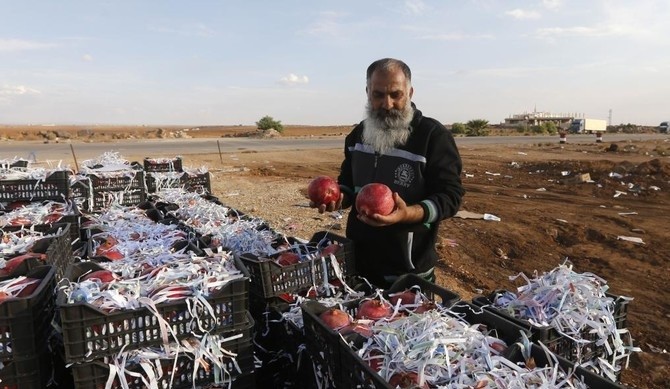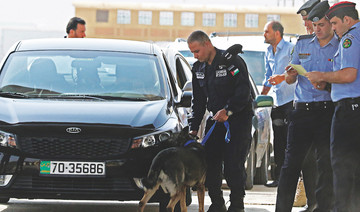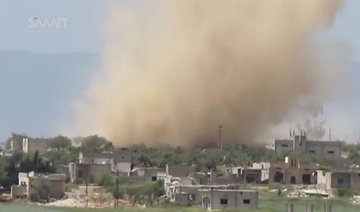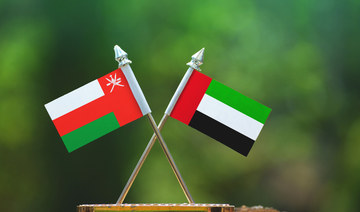NASSIB, Syria: Near the recently reopened border with Jordan, former Syrian rebel fighter Bahaa Al-Masri sells date-filled pastries and sesame biscuits to Jordanians flocking across the frontier to snap up bargains.
Syrian regime forces retook control of the Nassib border crossing from rebels in July, and last month reopened it after a three-year closure.
Just several hundred meters (yards) from the frontier, 26-year-old Masri counts the boxes of biscuits he still has left in a green plastic crate strapped to the back of his motorbike.
“For two weeks I have been bringing sweets from Damascus and selling them to Jordanians who come to buy them here because they’re cheaper,” says the ex-combatant, wearing a black jacket and woollen hat.
“I sell 27 to 30 boxes a day.”
Masri hawks the pastries every day in a rest area on the edge of Syria’s southern province of Daraa for three Jordanian dinars each (around $4, 3.5 euros).
“Thank God, when the border opened there was work again here, after I spent around six years without a job,” Masri tells AFP.
Because money was tight, he joined a rebel group that paid him a monthly wage to fight.
“I picked up arms so we could eat and live,” he says, crates of green apples and oranges stacked behind him.
Daraa was once seen as the cradle of Syria’s seven-year uprising, but in July regime forces took back control through a military push and deals that saw rebels surrender.
Under those agreements, brokered by regime ally Russia, many fighters chose to leave with their families to remaining opposition areas in northern Syria.
But Masri opted to stay and settled his status officially with the returning government authorities, a move likely to see him called up for military service.
Until the summons comes from the army, he is happy taking advantage of the money-making opportunities on offer now the border is open.
Also looking to cash in are Jordanian drivers, jokingly dubbed “sailors,” who ferry goods from Syria across the frontier for a small commission.
A whole economy has sprung up again since the border begun working.
At the crossing itself cars sit side by side in several long queues waiting to cross over into Syria.
Large trucks, some refrigerated, also wait their turn.
Before the war, “we used to come over to Syria every day — sometimes just to have breakfast,” says Mohammed Sayes, a 25-year-old from Jordan’s adjacent border town of Ramtha.
It was his second such trip since the border reopened “to see the sights, go out and eat” cheap, he says.
“Yes, Syria lived through a war, but we suffered a siege,” says the specialist in tourism management.
“When the border reopened, it was like paradise opened up again.”
Further up, dozens of people stand in line outside a row of small pre-fabricated buildings to have their Jordanian passports stamped by Syrian officials.
Jordanian driver Muflah Al-Hurani, 53, is crossing the border to drive a family back home from the Syrian capital Damascus just over 100 kilometers (60 miles) to the north.
He has been going in and out of Syria on an almost daily basis since Nassib reopened, to transport passengers or shop for relatives.
“I bring back fruit and vegetables including potatoes, onions, garlic, as well as children’s clothes made of cotton,” he says.
“And I fill up my car will fuel... It’s less than half the price (in Syria) despite the war.”
Not far off, the former arrivals hall is being repaired after it was damaged in the war.
Workers carry rubble away and a rebel slogan is still visible.
Damascus hopes the reopening of Nassib will boost its war-ravaged economy.
Before the conflict, the crossing was a key passage for trade, linking Syria — but also Lebanon and Turkey — with Jordan and the Gulf beyond.
Syrian officials have registered more than 33,000 arrivals since October 15, against 29,000 departures.
Among those waiting to head across the border are also Syrians returning home, car roofs piled high with suitcases and blankets.
Last week, a Jordanian official said 6,000 Syrians had gone back to their country, among them 517 registered refugees.
The head of the Nassib crossing Col. Mazen Ghandour says the number of people heading into Syria is increasing daily, and that most of those coming are Jordanians.
“Most Jordanians come to shop and then go home,” Ghandour says. “Others go to see Damascus.”
A few meters away, a Syrian woman living in Jordan smiles as she waits to cross over with her family for a two-week visit.
“Damascus is a blessing... That’s why everybody wants to visit after being cut off for so long,” she says.
At Syria border, Jordanians dash over for cheap shopping
At Syria border, Jordanians dash over for cheap shopping

- Syrian regime forces retook control of the Nassib border crossing from rebels in July, and last month reopened it after a three-year closure
- Syrian officials have registered more than 33,000 arrivals since October 15, against 29,000 departures
UN says Gaza death toll still over 35,000 but not all bodies identified

- Haq said those figures were for identified bodies — 7,797 children, 4,959 women, 1,924 elderly, and 10,006 men — adding: “The Ministry of Health says that the documentation process of fully identifying details of the casualties is ongoing”
UNITED NATIONS/GENEVA: The death toll in the Gaza Strip from the Israel-Hamas war is still more than 35,000, but the enclave’s Ministry of Health has updated its breakdown of the fatalities, the United Nations said on Monday after Israel questioned a sudden change in numbers.
UN spokesperson Farhan Haq said the ministry’s figures — cited regularly by the UN its reporting on the seven-month-long conflict — now reflected a breakdown of the 24,686 deaths of “people who have been fully identified.”
“There’s about another 10,000 plus bodies who still have to be fully identified, and so then the details of those — which of those are children, which of those are women — that will be re-established once the full identification process is complete,” Haq told reporters in New York.
Israel last week questioned why the figures for the deaths of women and children has suddenly halved.
Haq said those figures were for identified bodies — 7,797 children, 4,959 women, 1,924 elderly, and 10,006 men — adding: “The Ministry of Health says that the documentation process of fully identifying details of the casualties is ongoing.”
Oren Marmorstein, spokesperson for Israel’s Ministry of Foreign Affairs, on Monday accused Palestinian militants Hamas of manipulating the numbers, saying: “They are not accurate and they do not reflect the reality on the ground.”
“The parroting of Hamas’ propaganda messages without the use of any verification process has proven time and again to be methodologically flawed and unprofessional,” he said in a social media post.
Haq said UN teams in Gaza were not able to independently verify the Gaza Ministry of Health (MoH) figures given the ongoing war and sheer number of fatalities.
“Unfortunately we have the sad experience of coordinating with the Ministry of Health on casualty figures every few years for large mass casualty incidents in Gaza, and in past times their figures have proven to be generally accurate,” Haq said.
The World Health Organization “has a long-standing cooperation with the MoH in Gaza and we can attest that MoH has good capacity in data collection/analysis and its previous reporting has been considered credible,” said WHO spokesperson Margaret Harris.
“Real numbers could be even higher,” she said.
Five Iraqi soldiers killed in Daesh attack on army post in eastern Iraq, two security sources say

- Iraq’s defense ministry issued a statement mourning the loss of Col. Khaled Nagi Wassak “along with a number of heroic fighters of the regiment as a result of their response to a terrorist attack”
BAGHDAD: An Iraqi commanding officer and four soldiers were killed and five others injured on Monday in an attack by Daesh militants on an army post in eastern Iraq, two security sources said.
The attack took place between Diyala and Salahuddin provinces, a rural area that remains a hotbed of activity for militant cells that remain active years after Iraq declared final victory over the terrorist groups in 2017.
Iraq’s defense ministry issued a statement mourning the loss of Col. Khaled Nagi Wassak “along with a number of heroic fighters of the regiment as a result of their response to a terrorist attack.”
Security forces repelled the attack but many casualties fell in the process, the statement added.
UAE president presents Indonesia’s defense minister with Order of Zayed

- Subianto receives UAE’s highest civil honor in recognition of his contribution to improved bilateral cooperation
DUBAI: UAE President Sheikh Mohammed bin Zayed Al-Nahyan on Monday presented Indonesia’s defense minister, Prabowo Subianto, with the Order of Zayed, the UAE’s highest civil honor, in recognition of his contribution to the enhancement of cooperation between the countries.
During the meeting in Abu Dhabi, Subianto conveyed greetings from Indonesia’s President Joko Widodo and expressed his desire for the continued advancement and prosperity of the UAE, the Emirates News Agency reported. Sheikh Mohammed responded with similar wishes for Indonesia.
The president and defense minister also discussed the relationship between their countries, particularly as it relates to defense and military affairs, and ways in which it might be enhanced in the interests of both countries, and reviewed regional and international issues of mutual interest.
Sheikh Mohammed said he was keen to leverage the strong strategic ties between the UAE and Indonesia to deepen cooperation so that both nations benefit from shared opportunities for development and prosperity.
Kuwaiti emir, Omani sultan meet for official talks

- Leaders discussed the longstanding relationship between their countries
KUWAIT: Kuwait’s Emir Sheikh Meshal Al-Ahmad Al-Jaber Al-Sabah hosted Oman’s Sultan Haitham bin Tareq at Bayan Palace in Kuwait City on Monday for official talks.
The leaders discussed the longstanding relationship between their countries and explored avenues for enhancing cooperation in various sectors, the Kuwait News Agency reported.
They also addressed strategies for the advancement of the Gulf Cooperation Council, matters of shared interest and various regional and international affairs.
The meeting came during the sultan’s two-day state visit to Kuwait and was followed by a banquet held in his honor.
Kuwait’s Prime Minister Sheikh Ahmad Al-Abdullah Al-Sabah and other officials from the two countries also attended the meeting.
US doesn’t believe ‘genocide’ occurring in Gaza: White House

- White House National Security Adviser Jake Sullivan insisted that the responsibility for peace lay with Hamas
- Biden has come under fire from Republicans for halting some weapons shipments
WASHINGTON DC: The United States does not believe that genocide is occurring in Gaza but Israel must do more to protect Palestinian civilians, President Joe Biden’s top national security official said Monday.
As ceasefire talks stall and Israel continued striking the southern city of Rafah, White House National Security Adviser Jake Sullivan insisted that the responsibility for peace lay with militant group Hamas.
“We believe Israel can and must do more to ensure the protection and wellbeing of innocent civilians. We do not believe what is happening in Gaza is a genocide,” Sullivan told a briefing.
The US was “using the internationally accepted term for genocide, which includes a focus on intent” to reach this assessment, Sullivan added.
Biden wanted to see Hamas defeated but realized that Palestinian civilians were in “hell,” Sullivan said.
Sullivan said he was coming to the White House podium to “take a step back” and set out the Biden administration’s position on the conflict, amid criticism from both ends of the US political spectrum.
Biden has come under fire from Republicans for halting some weapons shipments to press his demands that Israel hold off a Rafah offensive, while there have been protests at US universities against his support for Israel.
The US president believed any Rafah operation “has got to be connected to a strategic endgame that also answered the question, ‘what comes next?’” Sullivan added.
This would avoid Israel “getting mired in a counterinsurgency campaign that never ends, and ultimately saps Israel’s strength and vitality.”
























